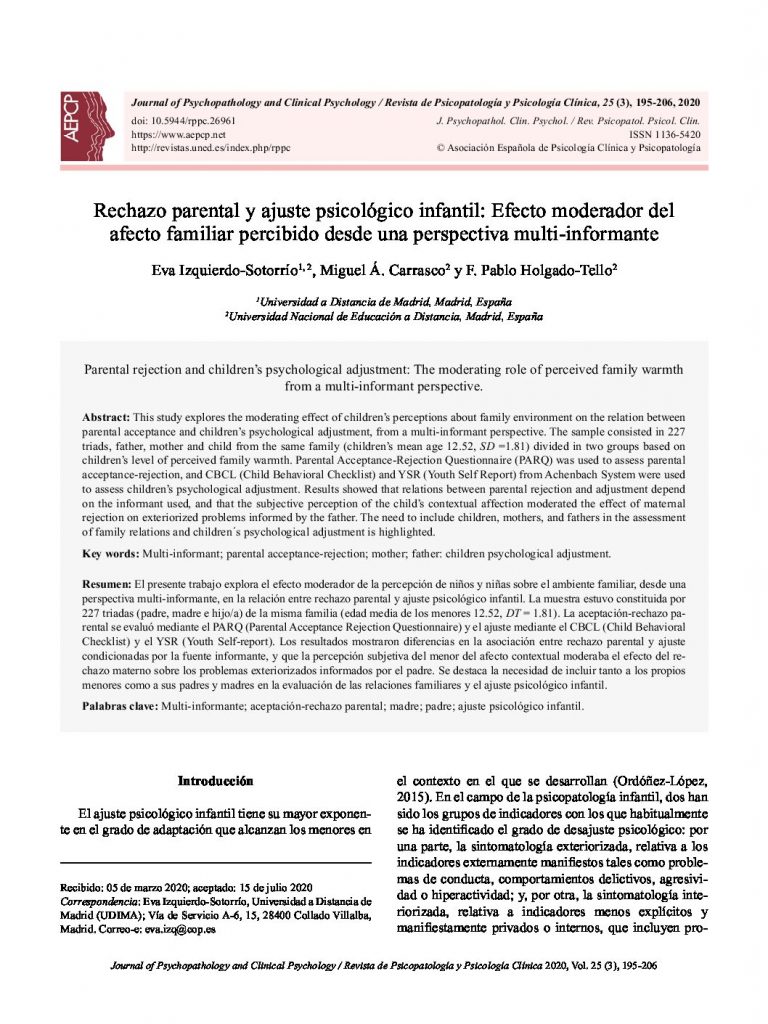Rechazo parental y ajuste psicológico infantil: efecto moderador del afecto familiar percibido desde una perspectiva multi-informante
Rechazo parental y ajuste psicológico infantil: efecto moderador del afecto familiar percibido desde una perspectiva multi-informante

- Innovaciones en la evaluación de los problemas emocionales en niños y adolescentes: Presentación del número monográfico
- Assessing psychological flexibility in test situations: The Test Anxiety Acceptance and Action Questionnaire for Adolescents
- Evidencias de Validez Diagnóstica de la Escala Detectaweb-Malestar
- Validación de la versión breve en español de la Escala UPPS-P de impulsividad para niños y adolescentes (BUPPS-P NA)
- Propiedades psicométricas y estructura factorial de la versión española de la Escala de Creencias de los Niños Sobre el Divorcio de los Padres (CBAPS)
- Rechazo parental y ajuste psicológico infantil: efecto moderador del afecto familiar percibido desde una perspectiva multi-informante
- Trastorno por Estrés Postraumático en infancia y adolescencia: cuestiones sobre diagnóstico y evaluación
- El Cuestionario de Esquemas de Young: Adaptación de una Versión Breve a Adolescentes y Jóvenes Españoles
- Información sobre los indicadores métricos de la Revista de Psicopatología y Psicología Clínica
This study explores the moderating effect of children’s perceptions about family environment on the relation between parental acceptance and children’s psychological adjustment, from a multi-informant perspective. The sample consisted in 227 triads, father, mother and child from the same family (children’s mean age 12.52, Sd =1.81) divided in two groups based on children’s level of perceived family warmth. Parental Acceptance-Rejection Questionnaire (PARQ) was used to assess parental acceptance-rejection, and CBCL (Child Behavioral Checklist) and YSR (Youth Self Report) from Achenbach System were used to assess children’s psychological adjustment. Results showed that relations between parental rejection and adjustment depend on the informant used, and that the subjective perception of the child’s contextual affection moderated the effect of maternal rejection on exteriorized problems informed by the father. The need to include children, mothers, and fathers in the assessment of family relations and children´s psychological adjustment is highlighted.
El presente trabajo explora el efecto moderador de la percepción de niños y niñas sobre el ambiente familiar, desde una perspectiva multi-informante, en la relación entre rechazo parental y ajuste psicológico infantil. La muestra estuvo constituida por 227 triadas (padre, madre e hijo/a) de la misma familia (edad media de los menores 12.52 DT = 1.81). La aceptación-rechazo parental se evaluó mediante en PARQ (Parental Acceptance Rejection Questionnaire) y el ajuste mediante el CBCL (Child Behavioral Checklist) e YSR (Youth Self-report). Los resultados mostraron diferencias en la asociación entre rechazo parental y ajuste condicionadas por la fuente informante, y que la percepción subjetiva del menor del afecto contextual moderaba el efecto del rechazo materno sobre los problemas exteriorizados informados por el padre. Se destaca la necesidad de incluir tanto a los propios menores como a sus padres y madres en la evaluación de las relaciones familiares y el ajuste psicológico infantil.



